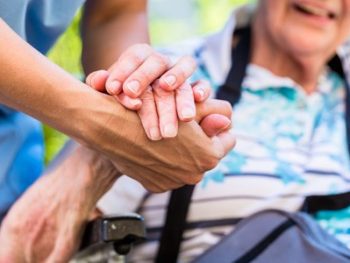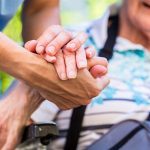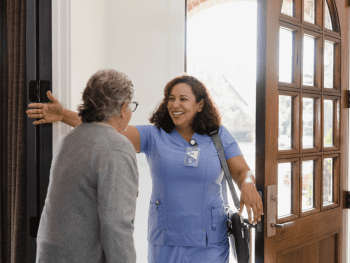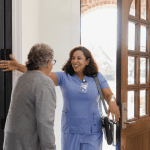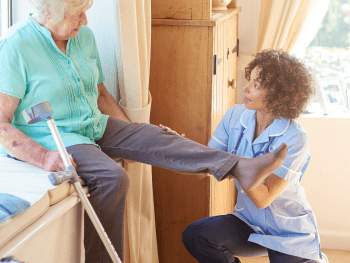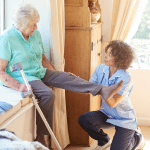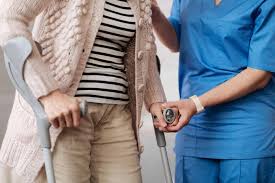 When the temperature drops, older adults run a higher risk of health problems and injuries related to the weather, including hypothermia, frostbite, and falls in ice and snow. Like most things in life, it is better to be prepared. Here are a few precautions everyone should take, especially older adults, during the winter.
When the temperature drops, older adults run a higher risk of health problems and injuries related to the weather, including hypothermia, frostbite, and falls in ice and snow. Like most things in life, it is better to be prepared. Here are a few precautions everyone should take, especially older adults, during the winter.
Hypothermia & Frostbite Hypothermia occurs when your body temperature drops to a dangerous level. Your body temperature can drop when you are out in the cold for an extended time because it begins to lose heat quickly. Older adults are at an increased risk of hypothermia due to changes that happen to your body with aging.
Hypothermia Warning Signs: cold skin that is pale or ashy; feeling very tired, confused and sleepy; glassy stare; feeling weak; problems walking; slowed breathing or heart rate. Call 911 if you think you or someone else has hypothermia. Shivering is not a reliable warning sign because older people tend to shiver less or not at all when their body temperature drops.
Frostbite occurs when a body part experiences damage to the skin from extreme cold. It is most likely to occur on body parts farthest away from your heart. Common places include your nose, ears, cheeks, chin, fingers, and toes. In severe cases, frostbite can result in loss of limbs. People with heart disease and other circulation problems are at a higher risk.
Frostbite Warning Signs: skin that’s white or ashy or grayish-yellow; skin that feels hard or waxy; numbness. If you think you or someone else has frostbite, call for medical help immediately. If frostbite occurs, run the affected area under warm (not hot) water, or place it against warm skin. Do not rub!
Precautions to take
- Stay indoors (or don’t stay outside for very long).
- Keep indoor temperature at 65 degrees or warmer.
- Stay dry because wet clothing chills your body more quickly.
- Dress smart- protect your lungs from cold air. Layer up! Wearing 2 or 3 thinner layers of loose-fitting clothing is warmer than a single layer of thick clothing. Think about getting your thermals!
- Essential winter wear: hats, gloves (or preferably mittens), winter coat, boots, and a scarf to cover your mouth and nose.
Injury While Shoveling Snow It’s one of the evils of winter—snow shoveling. If you choose to shovel, take some precautions. Remember, when it’s cold outside, your heart works double time to keep you warm. Strenuous activities like shoveling snow may put too much strain on your heart, especially if you have heart disease. Shoveling can also be dangerous if you have problems with balance or have “thin bones” (osteoporosis). 
- Ask your healthcare providerwhether shoveling or other work in the snow is safe for you. Some healthcare providers suggest not shoveling over age 45.
- Pace yourself. If you start to tire or become short of breath, take a rest break.
- Push snow rather than throw or lift whenever possible. Take smaller shovelfuls and avoid using large shovels. Bend your knees and lift with your legs.
- If you smoke, please do not smoke while shoveling, it will deprive your muscles of needed oxygen.
Falls It is easy to slip and fall in the winter, especially in icy and snowy conditions.
- Make sure steps and walkways are clear before you walk.
- Wear boots with non-skid soles or use traction cleats such as Yaktrax.
- If you use a cane, replace the rubber tip often and consider an ice pick-like attachment.
Accidents While Driving Adults 65 and older are involved in more car crashes per mile driven than those in nearly all other age groups. Winter is an especially important time to be vigilant when driving because road conditions and weather may not be optimal.
- “Winterize” your car before the bad weather hits! This means having the antifreeze, tires, and windshield wipers checked and changed if necessary.
- Remember your cell phone when you drive in bad weather, and always let someone know where you are going and when you should be expected back.
- Stock your car with basic emergency supplies such as: first aid kit, blankets, extra warm clothes, booster cables, windshield scraper, shovel, rock salt or a bag of sand or cat litter (in case your wheels get stuck), Water and dried food (nuts, granola bars), flashlight.
With a little preparation, we hope that you and your family stay safe and warm this winter. Happy Holidays from the team at Pemi-Baker Hospice & Home Health!
Pemi-Baker Hospice & Home Health is a trusted, nonprofit agency proudly serving 29 towns in central and northern NH since 1967. Expert services include at-home healthcare and physical therapies (VNA), hospice and palliative care, and community programs including: American Red Cross CPR/AED/FA, Caregiver and Bereavement Support Groups and Ask A Pemi-Baker Nurse days at your local senior centers. Providing compassionate care with experienced staff who are trained, certified professionals and also your neighbors. In your time of need, we’re right where you need us.
Pemi-Baker is located at 101 Boulder Point Drive, Suite 3, Plymouth, NH. To contact us please call: 603-536-2232 or email: info@pbhha.org Like our Facebook Page: @pemibakerhospicehomehealth


 How to Plan For Recovery at Home After Surgery
How to Plan For Recovery at Home After Surgery
